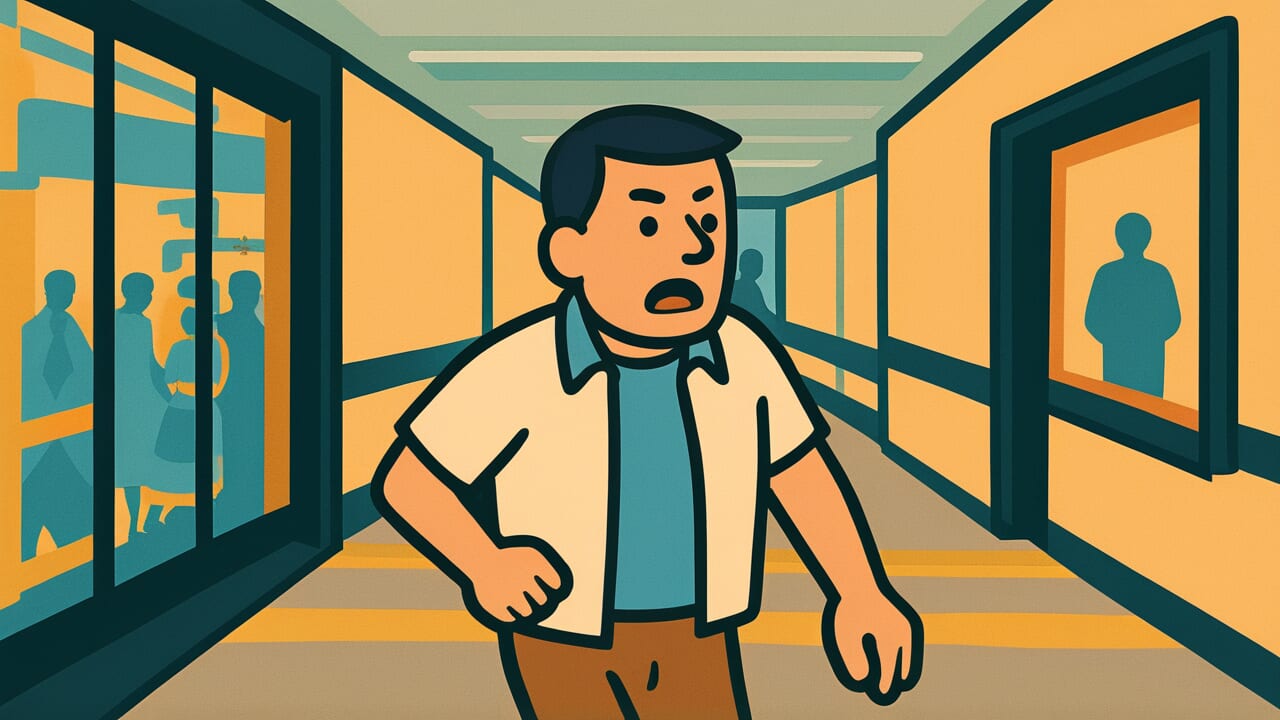How to Read “Angry at home, show it in the marketplace”
Shitsu ni ikarite ichi ni irosu
Meaning of “Angry at home, show it in the marketplace”
This proverb teaches that even when you feel anger at home, you should remain calm in public.
Even if something frustrating happens in your private space at home, you shouldn’t let that anger show on your face when you go out to the marketplace.
This isn’t just about hiding your emotions. It’s about understanding the importance of separating your private and public life.
The teaching is about social manners. You shouldn’t bring household troubles or personal frustrations into places where unrelated people gather.
Even today, showing personal emotions at work or with business partners is considered unprofessional.
If something bad happens at home and you use that as an excuse to be grumpy at work, you’ll bother others and lose their trust.
This proverb simply shows what it means to behave as a mature member of society.
Origin and Etymology
There are various theories about the exact origin of this proverb. No definitive source text has been identified.
However, we can understand it by looking at the structure of the words.
“Shitsu” (室) means inside the house, a private space. “Ichi” (市) means marketplace, a public place.
“Ikarite” means to feel anger. “Irosu” means to show it on your face.
So the structure means: even if you feel anger at home, don’t show it on your face at the marketplace.
This expression was likely influenced by ancient Chinese philosophy.
In Confucianism, there’s a saying about cultivating yourself, ordering your family, governing the country, and bringing peace to the world.
This taught a step-by-step moral view. The idea of separating private emotions from public behavior is rooted in this traditional East Asian ethical view.
There’s also a theory that merchants in Japan’s Edo period valued this mindset.
In business, not bringing household problems in front of customers was essential for maintaining trust.
The wisdom of clearly separating private feelings from public roles has been passed down as basic life knowledge for living in society.
Usage Examples
- Even if they had a fight at home, following “Angry at home, show it in the marketplace,” a true professional greets customers with a smile
- I was irritated after being scolded by my child in the morning, but with the spirit of “Angry at home, show it in the marketplace,” I tried to stay calm at work
Universal Wisdom
This proverb teaches us a fundamental truth: humans are social beings.
We don’t live alone. We constantly live within relationships with others.
To keep those relationships smooth, we need the power to control our emotions.
Anger is one of the hardest emotions for humans to control.
When something unpleasant happens at home, that feeling keeps swirling in your heart.
But if you take it out on unrelated people, you just create new problems.
This proverb shows the wisdom to break that emotional chain.
What’s interesting is that this proverb doesn’t tell you to suppress emotions.
Instead, it teaches the importance of expressing them in the right place and the right way.
Feeling anger at home isn’t denied. The issue is where and how you express that anger.
No human is perfect. Everyone gets irritated and angry sometimes.
But a mature adult is someone who can properly handle those emotions even while having them.
In this seemingly simple teaching about separating public and private life, there’s deep wisdom for keeping relationships smooth.
Our ancestors understood that the strength not to be controlled by emotions is true human maturity.
When AI Hears This
The energy of anger behaves surprisingly similar to physical heat.
When you feel anger in a closed room, that energy has nowhere to escape.
Like steam in a pressure cooker, it keeps building up inside.
As emotional “pressure” increases, it shows strongly as facial expressions and body tension.
But when you go out to an open space like a marketplace, the situation changes completely.
In thermodynamics, energy naturally spreads from high-density places to low-density places.
This is called the law of entropy increase. Emotions work the same way.
When you enter the vast space of a crowd, your anger’s energy gets dispersed among countless surrounding stimuli and information.
For example, in your room you were 100 percent focused on your anger.
But in the marketplace, visual information takes 30 percent, auditory information 20 percent, attention to others 25 percent.
Your psychological energy gets divided up like this.
What’s more interesting is the connection to the law of energy conservation.
The anger itself hasn’t disappeared. It’s just converted from a “visible form” as facial expression to a “latent heat” state hidden inside.
In physics, when ice becomes water, it absorbs heat but the temperature doesn’t rise.
Similarly, anger changes form and continues to exist. Emotions don’t vanish—they just shift to a harder-to-observe state.
Lessons for Today
What “Angry at home, show it in the marketplace” teaches you today is to take responsibility for your own emotions.
When something bad happens at home, bringing that anger to work or friendships is actually the easy choice.
But that doesn’t solve the problem. It just spreads it around.
In modern society, social media makes it easy to express private emotions in public spaces.
But that’s exactly why the ability to separate public and private has become more important.
What you post in a moment of emotion can come back to hurt you in unexpected ways.
This proverb isn’t forcing you to endure things.
Rather, it teaches that by properly managing your emotions, you can build richer relationships.
Handle anger at home appropriately at home. Then interact with people outside with a fresh mindset.
By doing this, you become someone others trust. And as a result, you feel better too.
Don’t be controlled by emotions. Become someone who handles emotions skillfully.
That’s the practical wisdom this proverb offers you today.



Comments